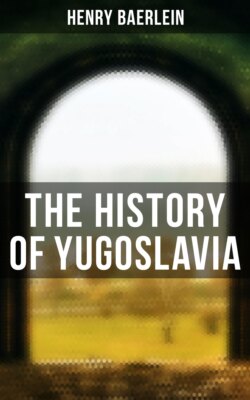Читать книгу The History of Yugoslavia - Henry Baerlein - Страница 73
На сайте Литреса книга снята с продажи.
THE PRINCE-BISHOP GIVES A LEAD TO THE SOUTHERN SLAVS
ОглавлениеNow Peter thought the moment had arrived for Jellačić to found at last an independent Yugoslav dominion. On December 20, 1848, he wrote to him: "An inscrutable destiny has placed you, O illustrious Ban, at the head of the Southern Slavs. You have preserved their throne, their destiny for the Habsburgs. … A grand mission is yours; from it may arise a new formation of Europe. Its accomplishment would absolve the Slavs from the shame of having been the miserable slaves or the paid creatures of others. As for me, I am free, at the head, it is true, of a handful of men, despite the double malediction of tyranny and espionage." [Here he is referring to his neighbours, Austria and Turkey.] "But what does that matter when I look round me at millions of brothers who are in alien bondage? Occupy Dalmatia immediately and let us join each other. That which one does not conquer with heroic right is worth nothing. I am ready to come to your help with my Montenegrins." To these overtures Jellačić gave an evasive reply. It may be that he did not deem the moment opportune, it may be that, as some have said, he came under the atavistic influence of the military traditions of the Croats, whose long years of fighting for the Habsburgs had made them as devoted to that House as the Dalmatians had been for so long to Venice. The Habsburgs had exploited them, but the Croats felt that they were bound by all the blood which they had shed and by the military glory they had won in Austria's service. Had not Tomasić and Milutinović been the Generals—both Croats—who were sent to change Napoleon's Dalmatia into a province of the Habsburgs? And the list is endless. Jellačić was very probably deceived by Francis Joseph, who kept dangling before his eyes a vision of a "Greater Croatia." But, by an irony of history, this hope of union of the Southern Slavs was for the time flung very much into the background by the action of the Tzar, who rescued Austria when in 1849 she was again at variance with the Magyars. Kossuth had been furious at the Constitution promulgated in the spring of that year, which not only made obsolete most of Hungary's privileges, but introduced the principle of equality among the various nationalities. The Hungarians had been too much accustomed to the classing of races as first-class people and second-class people. When they had been reduced—the Russian methods being drastic—and when their thirteen Generals had been executed at Arad, Francis Joseph thanked the Croats "for their ceaseless energy and for their numerous sacrifices in the interests of the State." But Jellačić did not move, and the Prince-Bishop wrote to Count Pozza, a friend of his at Dubrovnik. "I had hoped for an instant, my dear Count," he wrote, "but I am now convinced that Yugoslavism is, for the time being, merely an idle word. The Yugoslavs are unconscious of their own strength and sell themselves unconditionally to the strongest. It is a subject of profound grief for those who love them and for sensitive souls." Peter II. did not long survive. He may have wondered sometimes why the Croats did not call for him instead of Jellačić, since his methods of administration had been so successful in the principality. He may have meditated sometimes on the Russians, wondering how one nation could be both so highly meritorious and so bloodthirsty. He died, aged thirty-nine, a disappointed man. (His Turtle-Dove expired some time before.) And he was buried, as he wished, upon a lonely peak of Lovčen, that vast mountain over Kotor which, until the deed of his great-nephew's son, his namesake, was impregnable. Peter II. had always been a man apart—it was his opinion that his Church was being choked with formalism and with ceremonial, and though he was a Bishop he went to church infrequently. The poet in him was much more attracted to the Bogomile sect, which taught that God had two sons, of whom the elder was Satan and the younger Christ; and when the world was created, the elder, seeing how lovely it was, separated himself from his Father in order to rule the world; and afterwards God sent the younger son to punish him. … Peter had far greater merits as a poet than as a ruler. In fact, Pushkin is perhaps the only Slav poet who surpasses him, and his philosophy is more original than that of Tolstoi. There came to Montenegro one Ivanović, a Russian missionary, whom Peter appointed to be President of the Senate. Peter used to live chiefly in Venice, Rome or Naples, only coming to Montenegro as a guest, and it was during his residence in Naples that Ivanović introduced a number of reforms. According to the general opinion, Peter was the greatest Yugoslav that ever lived; as a ruler he was neither good nor bad.
